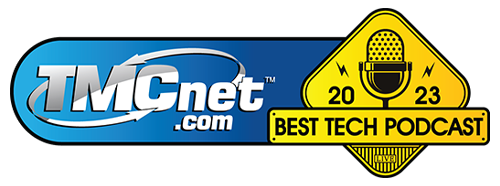Transcript for this Episode:
INTRODUCTION VOICEOVER: This is Tech UNMUTED. The podcast of modern collaboration – where we tell the stories of how collaboration tools enable businesses to be more efficient and connected. With your hosts, George Schoenstein and Santi Cuellar. Welcome to Tech UNMUTED.
SANTI: Welcome to the latest episode of our podcast, and today I want to review with you a study. It's a study we conducted recently. What we did is we polled 300 executives, director level and above in the IT industry in North America. We did this via Gartner Peer Insights, which is an online polling platform. What we tried to understand is what is the state of, well, modern collaboration. Where are things?
We asked them a few questions, and what I wanted to do today was really just kind of touch on the findings because I found the findings, while I might not have been surprised because, well, we are in this side of the business and we can kind of see where things are going, those who are trying to make intelligent business decisions as to their future collaboration solutions and needs, this might be very revealing to you. I'm going to go ahead and touch on three things that stood out, three specific things that really jumped out in this study.
The first one was really consolidation and ease of use were things that the majority really wanted to see. When I say majority, it was a pretty significant number. For example, 68% of businesses wanted to prioritize ease of use when choosing a collaborative platform. That's a big number when you think about it. Out of the 300, 68 said ease of use is priority. Another 51% said that they are using, ready for this, four or more collaboration tools or platforms and that they would actually rather just consolidate that. In fact, 20% of them said that they'd be motivated to reduce all these communication tools if they had a streamlined process to do so.
This makes sense to me, not just from a business perspective, but from an IT logistics perspective. I mean, the less platforms, the better off you're going to be. What's interesting is in a separate study, this is a study that was actually done by Microsoft, Microsoft is now claiming and I believe the claim because I was at Microsoft 365 in Vegas, they have reached 300 million active users in 2023. That's up from 270 million in 2022. Those are significant numbers. Those are huge numbers. Microsoft Teams continues to lead in this collaboration space.
Yes, there are others out there, but I'm not so sure they're showing the same level of growth as Microsoft Teams has, and rightfully so. In fact, right now, there's approximately 1 million companies or organizations using Microsoft Teams as their platform. That's a pretty big number. Imagine the infrastructure that Microsoft needs to have to support 300 million active monthly users. That's mind-blowing when you think about it from a technology standpoint. That was the first one that jumped out in the study; consolidation of platforms and ease of use. That was number one.
The second thing that jumped out in the study was cost savings, optimization, and security. While they're not necessarily related, but that was the next topic or the next thing that they pinpointed on was the cost savings or optimization of cost and security. Now, I will tell you security is always going to be at the forefront of most IT organizations' minds. It's the world we live in. The good thing is with Microsoft Teams, as well as some of the other platforms, I would say some maybe don't do it as well as others, but Microsoft Teams does a pretty good job at encryption.
The nice thing about Microsoft Teams is if you are on a Teams call, whether it's a video call, whether it's an audio call, whether maybe it's a screen share, whatever the case may be, whatever is going on between your Microsoft Teams client and somebody else's Teams client, all that information being shared and sent between all these clients is encrypted. Inherent safety is built in. As you all know, Microsoft is big on security. They have all sorts of security protocols in place in their cloud.
That's definitely a nice thing to know and a little bit of peace of mind when you're looking at possibly choosing Microsoft Teams as a collaboration platform. Now, the part about cost savings, while there is some savings, I agree with that statement, I believe there's also some cost optimization because think about it. A lot of these companies already invested in an enterprise agreement with Microsoft. There's an enterprise agreement in place. You're paying for that, and like anything else, you can choose to use as much of the licensing that's available to you or not.
It's amazing to me how many IT companies will have an enterprise agreement with a lot of capabilities, but they only leverage a portion of it, yet they're still paying for the whole agreement. The fact that you have an enterprise agreement with Microsoft and now you're saying, "Hey, I'm going to leverage Teams and maximize the investment," that to me is cost optimization. Yes, absolutely, using Microsoft Teams has been shown to help reduce costs as well. In fact, there is a separate study. This study was done by Microsoft themselves.
They actually called it The Total Economic Impact of Microsoft Teams, and the study's a couple of years old. I think it was 2019. The reality is, the numbers that they came up with, not only are they pretty significant, but I believe that they would apply today. They found that the information worker, so the average information worker, was saving an average of four hours per week from having improved collaboration and information sharing. Four hours is four hours. That's great. You can use those four hours for something else now and increase your productivity.
Not only that, but that same study found that decision-makers were improving their time to decisions by 17.7%, was the number I believe. Anyway, cost savings, cost optimization, security, that was the number two that jumped out in this particular study, and I agree with all of it. Finally, the third thing that jumped out of this study that we did, again, it was 300 executives, director level and up, IT industry, North America, this is what they pinpointed on. Interesting enough, it was culture. See, culture is big because-- I always tell folks it's hard to change a culture once a culture is established. Culture is a powerful thing.
When we talk about culture, we're talking about the fact that collaboration platforms can either have a positive impact on your company culture or a negative impact if it's not a good collaboration platform, let's be honest. Culture was important. Well, I'll tell you, there is stats that show that there is improved worker satisfaction when you have the proper tools in the information worker's hands, and actually, you even reduce attrition rates when you do that. When you provide people, especially honestly, the younger generation, they grew up with technology.
They're expecting to walk into an organization and have an organization established from an IT perspective with the tools that they're going to need to be successful. That's expected these days. When you do that, studies have shown that not only do you improve the worker satisfaction, but you reduce attrition. Actually, the attrition rate for workers decreases from 11.8 to 11.4 when you have the proper technology in place, especially the collaboration platform that they're going to be using, so culture is a big thing. Microsoft Teams is very, very focused on that.
The whole avatar concept where everybody can be part of a meeting no matter what your situation is, maybe it's too early and you're not camera ready or maybe you're camera shy or maybe you're just video fatigued from being on camera all day long, it seems like a minor thing. "Oh, so what? You have some avatars." No, it's all about the culture. It's all about, I'm still part of this meeting. You're not seeing just some icon with my initials on it. You're seeing a representation of me, and that's why they built these avatars because culture matters.
Anyway, this is really a short overview of this study. If you want the details of the study, we're going to include a link to a blog that's going to accompany this study that we just completed for you to go back, click on there, and review in greater detail. Until next time, remember this, stay connected.
CLOSING VOICEOVER: Visit www.fusionconnect.com/techunmuted for show notes and more episodes. Thanks for listening.
Episode Credits:
Produced by: Fusion Connect



 Amazon Music
Amazon Music Podcast Index
Podcast Index TuneIn
TuneIn Listen Notes
Listen Notes